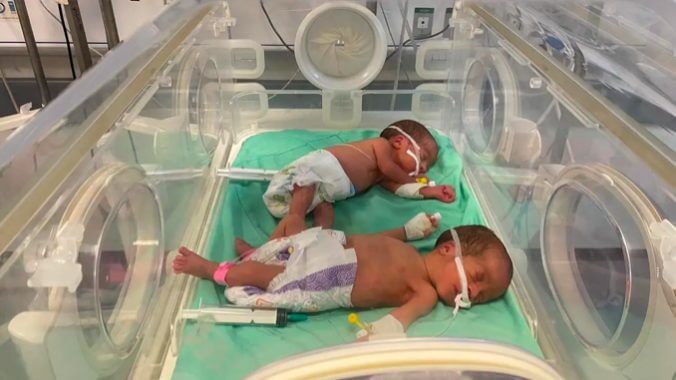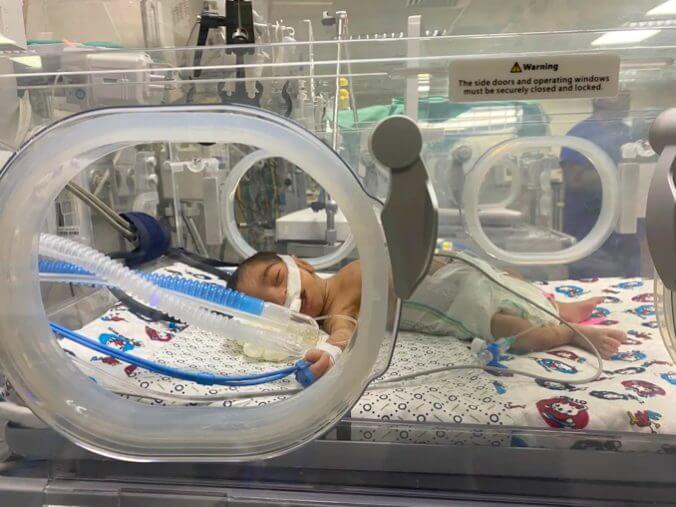As Gaza’s Hospitals Run Out of Fuel, Incubated Preterm Babies ‘Will Not Make It’
“The babies are utterly dependent [on incubators]—the only thing that will happen is they will die,” a World Health Organization spokesperson told Jezebel.
In Al Shifa Hospital in Gaza, two preterm babies rely on an incubator to breathe. This photo was taken by Dr. Nasser Bulbul, head of neonatal intensive care at Al Shifa, on Oct. 21.Photo: Courtesy of Medical Aid for Palestinians In Depth Gaza
In Al Shifa Hospital in Gaza, there’s an orphaned, premature baby who was born at 32 weeks, shortly before his mother died. He’s alive solely due to an incubator that allows him to breathe, Fikr Shalltoot, Gaza director of Medical Aid for Palestinians (MAP), told Jezebel. “The baby was saved from his mum who was dying, and sadly doctors couldn’t save her,” after “she and other family members were killed in Israel’s bombardment in northern Gaza,” doctors at Al Shifa told Shalltoot. “The little baby is the only survivor in the family.”
At Nuseirat refugee camp in Gaza, a woman named Nisma Hajjaj told The National that she gave birth prematurely after fleeing Israeli attacks. Since her preterm newborn’s oxygen levels dropped, the baby is now in an incubator. “The situation here is not safe,” she said. “There is shelling all the time and the shortage of fuel threatens the life of my baby.”
According to Gaza’s Health Ministry and the World Health Organization (WHO), these two infants are among at least 130 preterm babies being incubated across Gaza’s seven neonatal ICUs. They’re at risk of imminent death as overcrowded hospitals run out of the fuel needed to power electricity generators. WHO spokesperson Dr. Margaret Harris told Jezebel that about 200 Gazans give birth per day, and they’re “giving birth in conditions that nobody should be giving birth in.” An estimated 50,000 to 84,000 women in Gaza are pregnant right now.
The health ministry declared this week that Gaza’s health system “is in a state of complete collapse.” If hospitals lose electricity, the ministry told The National, a newspaper based in the United Arab Emirates, “all will die” in the neonatal wards. Dr. Hatem Edhair, head of the neonatal unit at Nasser Hospital, said his hospital has 10 babies in its neonatal ward, half of whom are on oxygen machines. The situation is dire: “We have about 48 hours of fuel left. If the hospital runs out of fuel, half of these babies will die in less than 24 hours,” Edhair said in a statement shared with Jezebel through Shalltoot on Thursday. “They will not be able to make it without oxygen.”
Al Aqsa Hospital spokesman Abed Al Haleem Mikdad told The National on Sunday that his hospital’s neonatal ward, which holds more than 20 preterm babies in incubators, “will turn into a morgue without electricity and fuel.”
-

-

-

-

-

-

-

-

-

-

-

-

-

-

-

-

-

-

-

-

-

-

-

-

-

-

-

-

-

-

-

-

-

-

-

-

-

-

-

-









































